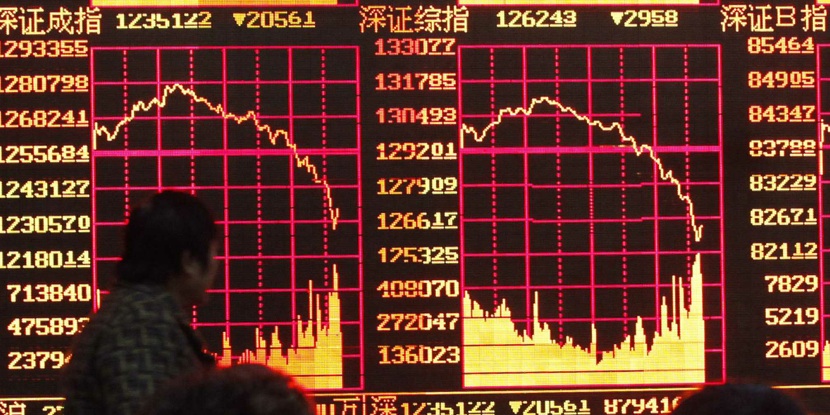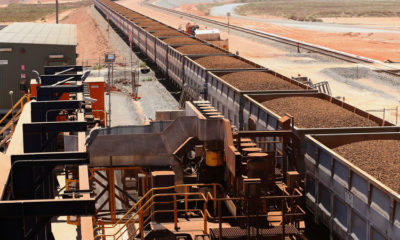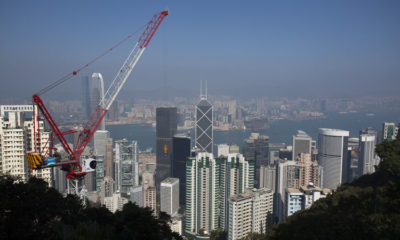Chinese stocks headed for their worst start to a year on record after manufacturing data showed evidence of a deepening economic slowdown and the yuan sank to its lowest in five years.
The Shanghai Composite Index declined 3.9 percent at 11:12 a.m. local time, the biggest first-day decline since trading began in 1990. The Hang Seng China Enterprises Index extended the largest annual drop among Asian benchmark gauges. The offshore yuan depreciated 0.6 percent.
China’s first economic reports of 2016 showed the official purchasing managers index weakened for a fifth straight month, the longest such streak since 2009, despite a series of interest-rate cuts and stepped up fiscal stimulus. While the Shanghai Composite ended higher for 2015, the H-share gauge in Hong Kong sank 19 percent on concern the deteriorating economy and weaker yuan will hurt the outlook for earnings.
‘The weaker PMI and the weaker yuan are the likely triggers,” said Michael Every, head of financial markets research at Rabobank Group in Hong Kong. “Fundamentals will see the market struggle, especially as I think the yuan in Shanghai and Hong Kong have a lot further to fall.”
A ban on selling by major stockholders on mainland exchanges is due to expire this week. Goldman Sachs Group Co. estimates the restriction affected investors with over 1.2 trillion yuan ($185 billion) of holdings and lifting the restriction may create a “liquidity risk,” according to a Dec. 3 note.
The Hang Seng Index fell 2.1 percent after last year’s 7.2 percent decline. Bank of East Asia Ltd. sank the most since July, while Li & Fund Ltd. tumbled 4.9 percent. The Hang Seng China Enterprises dropped 2.5 percent, extending 2015’s 19 percent plunge. The CSI 300 Index declined 3.4 percent.
“The overall market’s mood is still bearish after weak PMI readings,” said William Wong, head of sales trading at Shenwan Hongyuan Group Co. in Hong Kong. “Investors are also concerned that a removal of major shareholders’ selling ban would weigh on the indexes.”
The China Securities Regulatory Commission announced July 8 that investors with holdings exceeding 5 percent as well as corporate executives and directors would be prohibited from selling stakes for six months. The rule, which followed the suspension of initial public offerings and curbs on short-selling, was intended to stabilize capital markets amid an “unreasonable plunge” in share prices, according to the securities regulator.
Manufacturing Indexes
Today’s declines may test a stock-market circuit breaker that was put in place effective Monday. Under the new mechanism, a move of 5 percent in the CSI 300 will trigger a 15-minute halt for stocks, options and index futures, while a move of 7 percent will close the market for the rest of the day.
The purchasing managers index edged up to 49.7 last month from a 3-year low of 49.6 in November, the National Bureau of Statistics said Friday. The non-manufacturing PMI, meanwhile, rose to 54.4, the highest since August 2014. The private Caixin China Manufacturing PMI index decreased to 48.2, down from a five-month high of 48.6 in November. Numbers below 50 indicate deterioration.
“It is certainly an inauspicious start, but it is not indicative of performance down the road,” said Bernard Aw, a strategist at IG Asia Pte in Singapore. “Markets are expecting more rate cuts to materialize, that could support the equities. Moreover, China still needs to adjust to the gradual withdrawal of rescue measures, where the scale of the volatility resulting from the acclimatisation is far from certain.”
Shanghai Premium
While mainland authorities are lifting support measures for the stock market imposed at the height of a $5 trillion rout, Chinese stocks in Hong Kong are trading at some of the cheapest levels among global equities as foreign investors head for the exits. Dual-listed stocks are 40 percent more expensive on the mainland than in Hong Kong, according to the Hang Seng China AH Premium Index.
China will also scrap the upfront payment rule for IPOs from Jan. 1 as regulators seek to create a more level playing field for the country’s army of individual investors before the start of more substantial reforms. The statement last week by the China Securities Regulatory Commission confirmed plans first announced in November, when the regulator allowed new share sales to resume.
Also from this week, stock-index futures trading starts at 9:25 a.m., 10 minutes later than previously, while the afternoon session will end at 3 p.m., which is 15 minutes earlier.


 Forex2 weeks ago
Forex2 weeks ago


 Naira1 week ago
Naira1 week ago
 Naira4 weeks ago
Naira4 weeks ago
 Company News4 weeks ago
Company News4 weeks ago
 Billionaire Watch1 week ago
Billionaire Watch1 week ago




 Naira2 weeks ago
Naira2 weeks ago




 Naira3 weeks ago
Naira3 weeks ago




 Naira1 week ago
Naira1 week ago





















